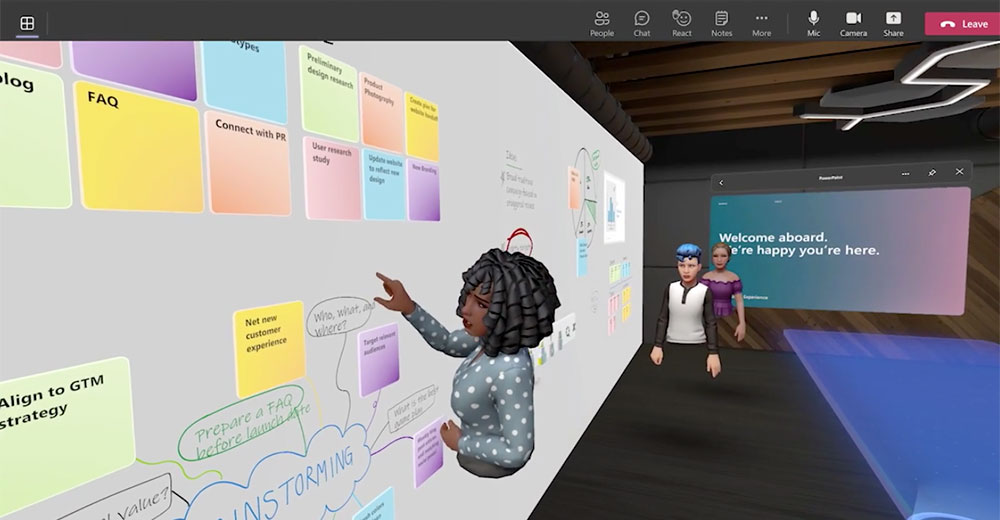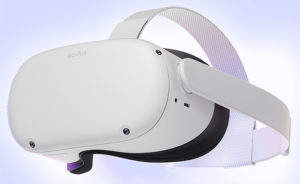Microsoft offered a glimpse of the metaverse in the enterprise Tuesday at its Virtual Ignite conference with the announcement of Mesh for Teams and Dynamics 365 Connected Spaces.
Mesh for Teams combines the mixed-reality capabilities of Microsoft Mesh, which allows people in different physical locations to join collaborative and shared holographic experiences, with Teams, Microsoft’s online meeting, chat, and collaboration product.
With Dynamics 365 Connected Spaces, formerly Dynamics 365 Connected Store, an organization can gather data about its physical spaces and gain insights from that data using artificial intelligence. For example, it could track foot traffic through a retail space, gauge interest in special displays, or reduce checkout lines in real time.
“The metaverse enables shared experiences across both the physical and digital worlds,” Microsoft’s Corporate Vice President for Communications Frank X. Shaw explained in a company blog.
“As enterprises accelerate their digital transformation, the metaverse can help people meet up in a digital environment, make meetings more comfortable with the use of avatars, and facilitate creative collaboration from all around the world,” he wrote.
Back to Office Headwind
Microsoft’s announcement of its two new metaverse apps comes on the heels of Facebook announcing a name change to Meta, a sign that it sees building out the metaverse as the key to its future success.
“It’s a hot topic, so Microsoft jumped on the attention that Meta-the-company has been getting,” observed Bob O’Donnell, founder and chief analyst with Technalysis Research, a technology market research and consulting firm in Foster City, Calif.
“The ironic thing is that all this is happening just as we see people going back to the office, in which case the demand for some of this stuff is not going to be as big as it appears right now,” he told TechNewsWorld.
“People will find that going back to the office will address some of the issues this technology attempts to address,” he said.
“Having said that,” O’Donnell continued, “there is no question that people will continue to look for hybrid solutions. In those situations where people are working remotely or in a hybrid environment, they’ll want better collaboration tools. That’s what Microsoft is offering.”
Work in Progress
O’Donnell explained that Microsoft, through applications like Mesh for Teams and Dynamics 365 Connected Spaces, is saying there will be different types of metaverses. “It’s saying you can do a lot more practical and business-focused things than just these crazy kinds of consumer applications,” he said.
These tools give us a limited view of the metaverse, noted Rob Enderle, president and principal analyst at the Enderle Group, an advisory services firm in Bend, Ore.
“This begins to give us an early sense of a small part of what the metaverse will be able to do,” he told TechNewsWorld. “But this is like reviewing a book after just seeing one mostly complete chapter. To get a total sense of the metaverse, we’ll need to wait until most of it is completed, and that is years off.”
Michael Inouye, a principal analyst at ABI Research, agreed that the metaverse as a realized concept is still many years away, but as that future is approached, there are many ways a platform like Mesh for Teams can advance the cause.
“Digital assets and virtual goods, for example, will play a larger role in how users express themselves and represent their digital personas and places of work,” he told TechNewsWorld.
“We can consider the rise in NFTs [or non-fungible tokens] as an early indicator — along with virtual goods and cosmetics in gaming — that the marketplace is starting to view virtual items on a similar level as physical and real goods,” he said.
“This is why many compare the metaverse to the internet,” he observed. “It will be the fabric that connects what are currently disparate experiences and applications together.”
Device Independence Important
Mesh for Teams is a very early, very crude manifestation of the nascent metaverse, maintained Darin Stewart, a research vice president at Gartner.
“Enabling people to interact in a semi-immersive environment is the most obvious aspect represented, but device independence is more important,” he told TechNewsWorld.

Teams Virtual Meeting Space (Credit: Microsoft)
“The ability to use any device or headset to access Mesh is the key characteristic that qualifies it to be a metaverse tool,” he explained.
“The whole point of the metaverse is to evolve the internet into an immersive and inclusive environment,” he continued. “This requires a neutral playing field that allows platforms from multiple vendors and developers to interact seamlessly.”
At this point in time, entering the metaverse can be a problem, too, because the headsets used to access it are uncomfortable if worn for long periods of time.
“Until Mesh for Teams and other mixed reality enablers are available in a form as convenient as normal reading glasses, applications like these, and the metaverse as a whole, will be little more than a tool for specialists and a novelty for general users,” Stewart said.
Improved Productivity
Both Mesh for Teams and Dynamics 365 Connected Spaces have the potential to improve productivity and operational efficiencies in businesses.
“The benefit of working together with products like Mesh is they make people feel as if they are interacting in the same room,” explained Wayne Kurtzman, research director for social, communities and collaboration at IDC.
“They see the same things, and in real time,” he told TechNewsWorld. “For training, onboarding, technical work, education or just being in a meeting together, there is significantly greater and more authentic engagement.”
Inouye pointed out that Mesh for Team’s kind of immersive collaboration has already proven its value in industries such as application engineering, manufacturing, and design, where teams can work on 3D projects simultaneously or in parallel.
“This greatly improves efficiency, ensures greater accuracy, and allows companies to be more innovative,” he said.
Wrestling With Data
With Dynamics 365 Connected Spaces, businesses can get a better handle on the data being created by the numerous devices interconnected in the metaverse. It can help companies collect, organize, and analyze data and then implement changes and updates based on those results.
“Companies may find ways to increase efficiencies, better target their customer base, and personalize their experiences,” Inouye noted.
“This runs the gamut of applications and depends greatly on the industry and use cases, but regardless, if you’re talking about video workflows, warehouse or retail locations, data will have a critical role in how organizations adapt to changing market demands and improve their operations.”
In announcing its metaverse tools so close to Facebook’s refresh as Meta, Microsoft could be doing so with some risk.
“Unfortunately, the timing of the announcement juxtaposes the genuine potential of Mesh with widespread criticism of Facebook’s rebranding as Meta and its rollout of its own avatar-based presence platform,” observed J. P. Gownder, vice president and principal analyst at Forrester Research.
“Enterprise leaders remain skeptical of Meta’s approach, evincing concern about Facebook’s commitment to security, privacy, and ethics,” he told TechNewsWorld. “Given the similarity of the two announcements, Microsoft may be painted with the same broad brush.”

























































